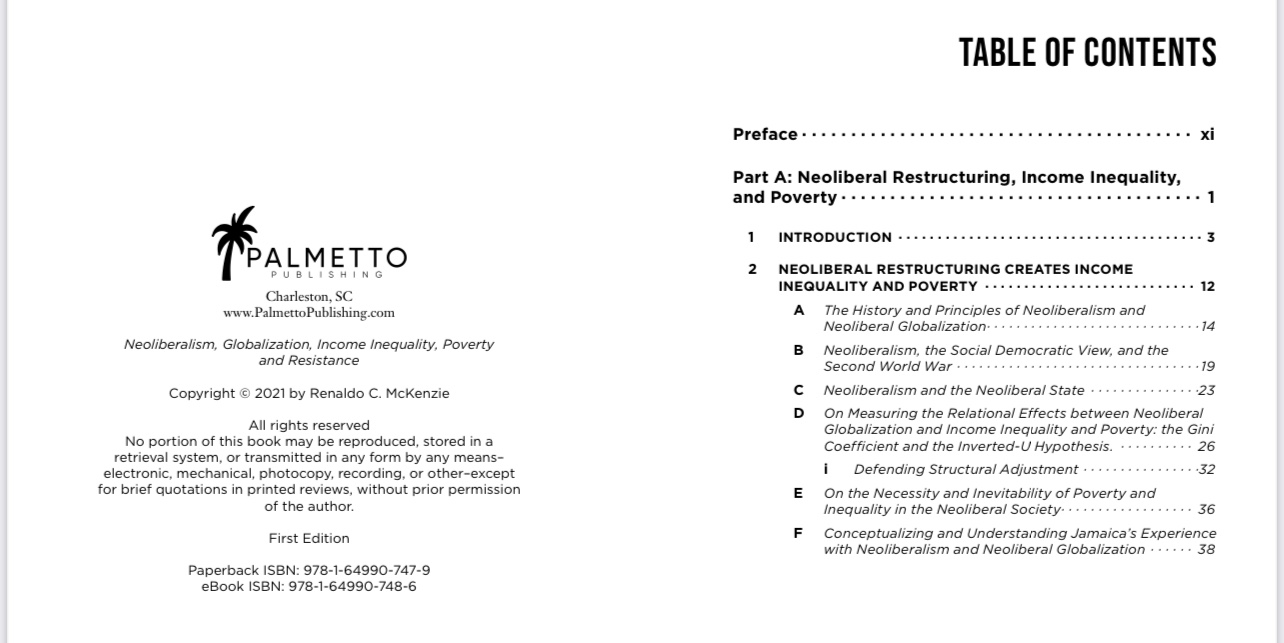Neoliberalism was written by Reverend Renaldo McKenzie, M.Phil, M.A; Doctoral Candidate, Georgetown University; Graduate, University of Pennsylvania; Lecturer, Jamaica Theological seminary; President, The Neoliberal.
Neoliberalism, Globalization, Income Inequality, Poverty, and Resistance is an examination of philosophy, politics, and economics in relation to the United States, Jamaica, other formerly colonized countries such as Barbados, and the world at large. Neoliberalism is an in-depth look at how large-scale Western capitalist forces affect and, in general, harm smaller countries and their own citizens who are usually black, brown or people of the Global South. It considers the efficacy of the Resistance to bring about change. The effectiveness of the resistance will be determined by the extent to which they have real- ized actual power: “demonstrated change in the desired direction. Available at Amazon
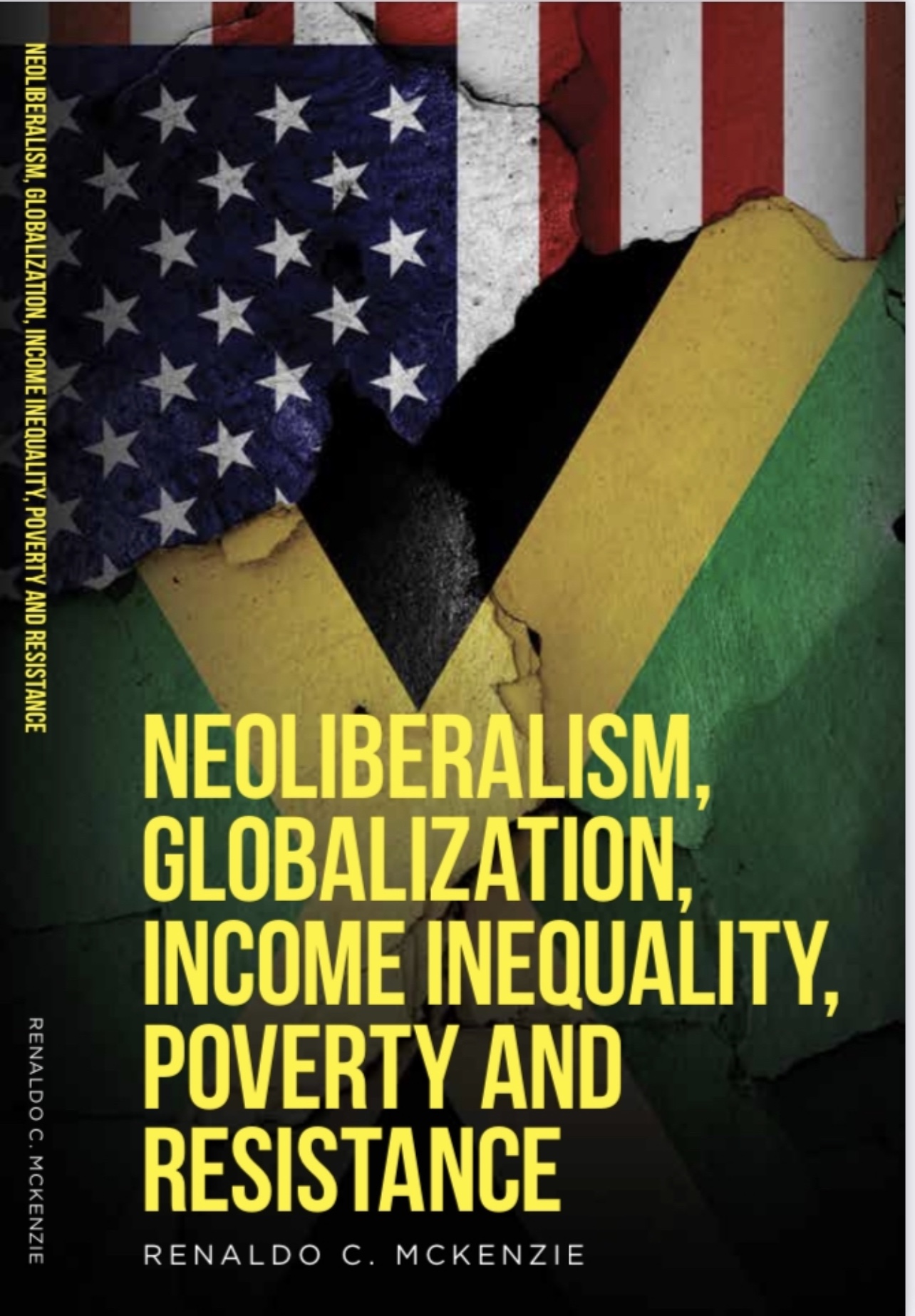
Table of Contents
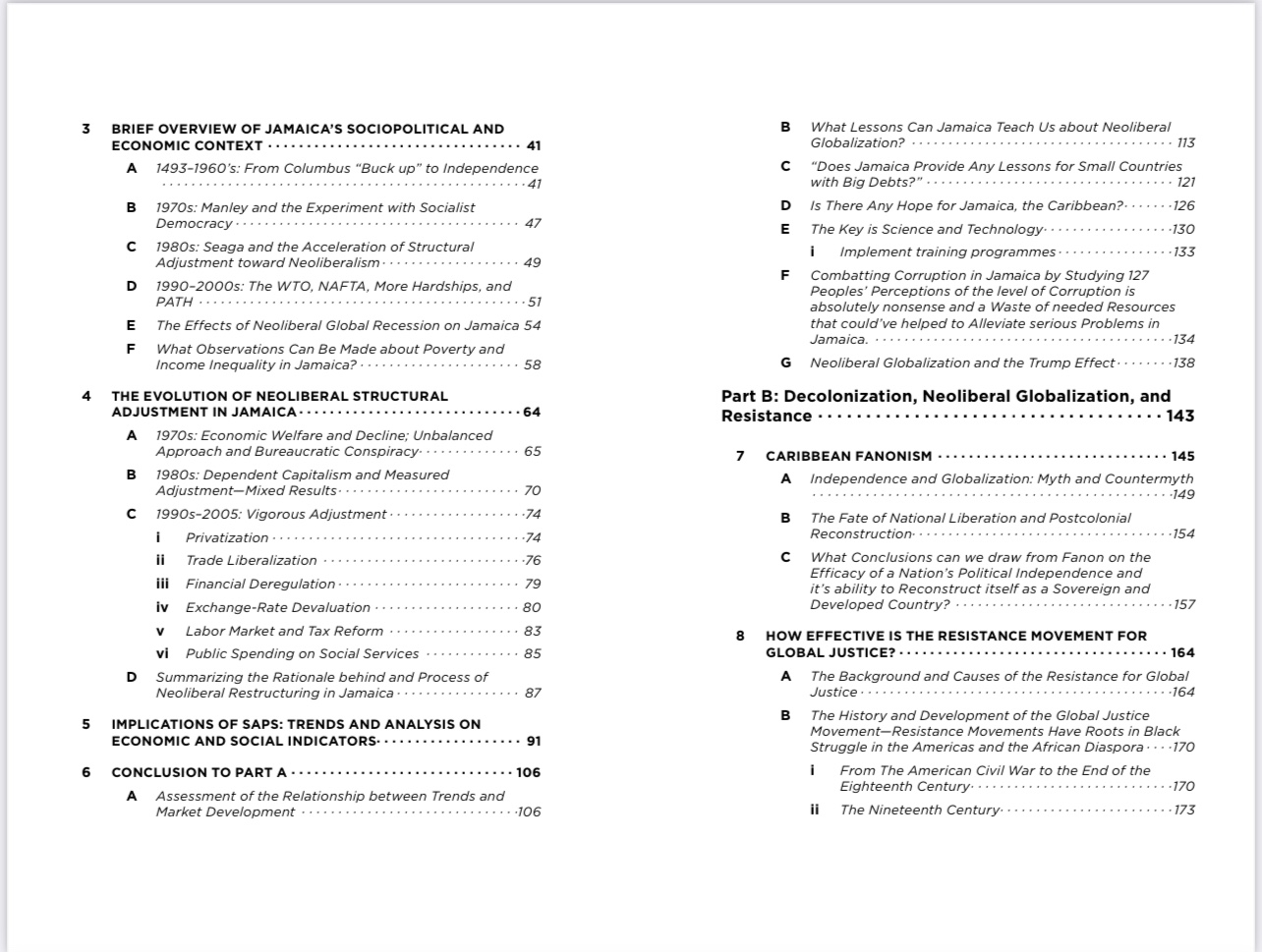
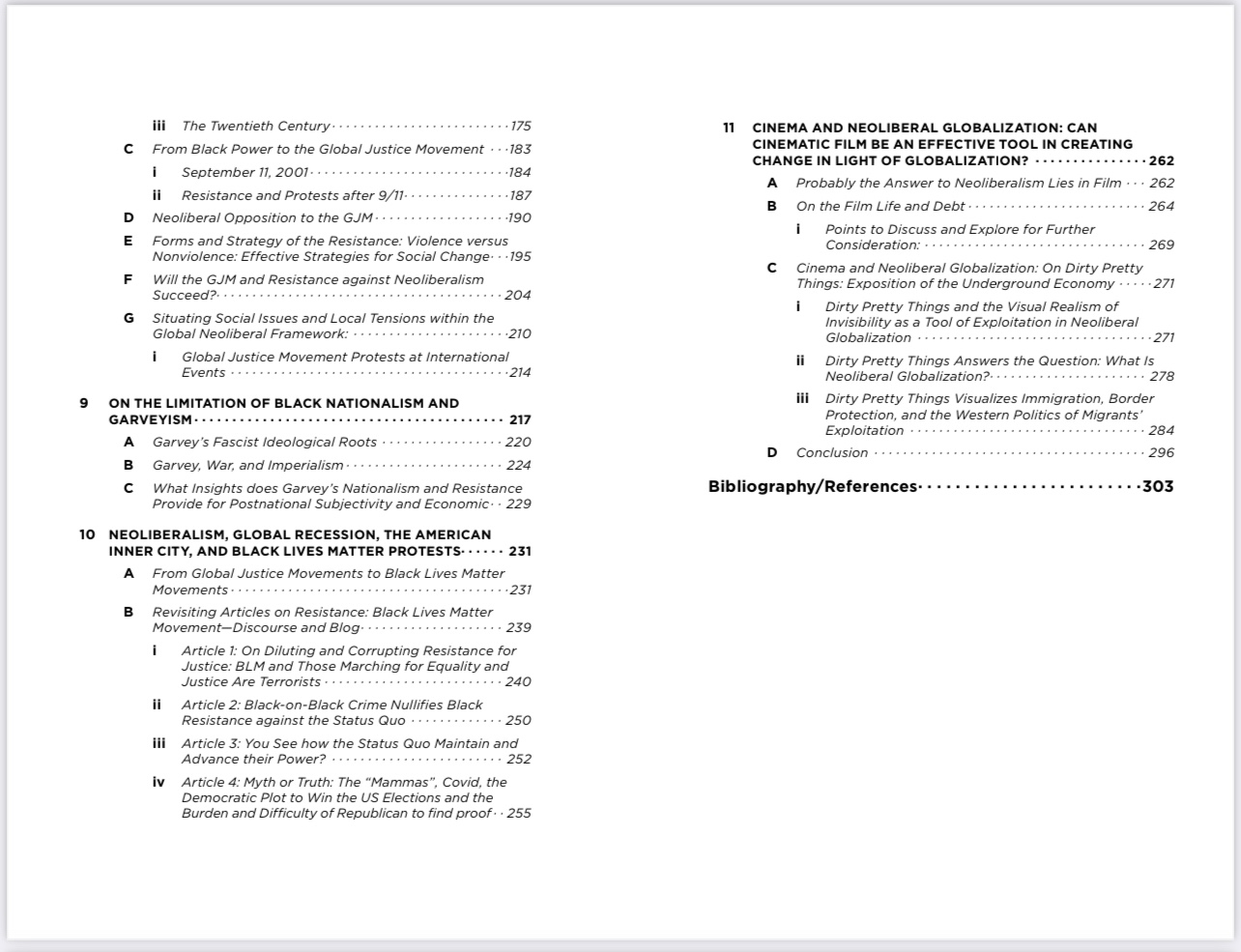
Preface
When we hear of Jamaica or Caribbean we think of beautiful islands of paradise with sun, sea and sand, reggae music, cannabis and ‘irie’ people like Usain Bolt. People who are living out their best dreams, desires and lives. But this book analyses this motif, given the historical and current economic and political situation in Jamaica and the Caribbean, and by extension the ‘global south’ and its diaspora. We will discuss their ability or inability to chart their own futures since decolonization and realize real political independence and economic prosperity. Perhaps, they are charting their own course by the few corrupt status quo who are benefitting from partnerships with the neoliberal regime of the ‘Washington Consensus’, advocates of the ‘bureaucratic phenomenon’; while the masses are left behind. John Williamson, the inventor of the term “Washington Consensus,” believes the term has two quite different meanings. First is the meaning he gave the term, which involved consensus around a set of ten policy reforms, which he believed were widely accepted as beneficial by economists. In the original formulation, these were:
(i) fiscal discipline; (ii) a redirection of public expenditure priorities toward fields offering both high economic returns and the potential to improve income distribution, such as primary health care, primary education, and infrastructure; (iii) tax reform (to lower marginal rates and broaden the tax base); (iv) interest rate liberalization; (v) a competitive exchange rate; (vi) trade liberalization; (vii) liberalization of FDI inflows; (viii) privatization; (ix) deregulation (in the sense of abolishing barriers to entry and exit); and (x) secure property rights. Second is the meaning the term has acquired: market fundamentalism or neoliberalism: laissez-faire, Reaganomics, let us bash the state, the markets will resolve everything. We use the term in the latter, now more than the common, usage.[1]
Our examination on the matter will be interdisciplinary. It relies on the readers abilities, knowledge (primary or secondary) and skills to challenge, critically analyze and develop their own thinking within a Jamaican, Caribbean, its diaspora and or American context given this century’s challenges and opportunities. This book is facilitatory as it provides a basis upon which the reader can think substantively and critically about the Jamaican, Caribbean and its diaspora in America, and to explore wholistically, solutions to Caribbean and pan-African problems. So that they can continue to develop and express these thoughts in a structured, creative, and a way that is unique to them, that will lead towards meaningful and sustained improvements in them and their people’s standard of living.
This project is divided into two parts. Part A will examine whether Jamaica’s inequality trends from the mid 1970s up to the beginning of the twenty-first century were a consequence of the structural adjustment policies stipulated by the neoliberal technocrats of the “Washington Consensus” in Jamaica. We will attempt to do so by tracing the impact of “structural adjustment” on Jamaica’s economy and the relationship to this on income inequality and poverty in Jamaica from 1960s to 2008 with updated 2020 figures. We will argue that, given the premise, Jamaica presents a unique cause and effect scenario that continues to question the veracity and validity of the premise that neoliberalism is the ‘sine qua non’ of development. We will explore and compare Jamaica with other Caribbean contexts and consider situations that are similar to these contexts in the diaspora in the US, whose people in the inner-cities who are also reeling from the effects of neoliberal globalization. For consideration of this study, which began in 2010, I must admit that I am biased by my own experiences as a post-colonial man living in a post-industrial country or superpower, the USA. What voice do I have if any and what are the threats to that voice? We will consider Caribbean and pan-African contexts and thinkers such as Fanon and his contemporaries who have questioned whether Jamaica like other Caribbean and former colonies and their people’s are free of external control and power. We will argue that his illusion of freedom comes from a dominant globalist worldview within which those in the global south find themselves competing not just for ‘scarce benefits and spoils’ but against two dominant forces vying for control – East versus West, Marxist-socialist ideology versus Capitalist-Adam Smith-Keynesian free-market principle.
Part B will argue, given Jamaica’s experience with neoliberal restructuring, that Jamaica—like many former colonies—is far from independent. From 1985–2000, the Caribbean since World War II has undergone significant economic policy transformation. This has been the result of a resurgence of liberalism (in its new form – neoliberalism) in the 1980s when the Right dominated the US-UK political landscape with the emergence of Reagan and Thatcher at the political helm, who promoted market deregulation and the expansion of neoliberal activities and ideologies in the Global North-South.[2] The fact is that decolonization and neoliberal globalization have deepened Jamaica’s dependence on the new global elite of the ‘Washington Consensus’. We will explore how Fanon’s ideas apply to the de- and recolonization and neoliberal globalization experience of Jamaica. My own observations are oriented by my interest in the political economy of decolonization and neoliberal globalization.
Further, we will consider the response to the processes of decolonization and globalization that have deepened the realities of the peoples of the Global South and the peoples in the diaspora. There has been hundreds of protests against the ‘Washington Consensus’ and their lackeys since 1976 by the Global Justice Movement since 1976 and since recently the Black Lives Matter Movement in America. Street protests and some degree of violence have been the main strategies of the group until recently. But are the resistance movements closer to achieving its aims? The effectiveness of these resistance will be determined by the extent to which they have realized actual power: “demonstrated change in the desired direction.”[3] Essentially, we are interested in exploring, by virtue of good reason, whether actions of resistance have had any meaningfully affected the daily lives of the poor and marginalized peoples in countries like Jamaica and its diaspora in the US. How close is the Global Justice Movement is to achieving its demands, such as tax on speculative capital flows, radical education of developing world debt and poverty, food and water security, economic equity, and international justice and peace.[4] Geoffrey Pleyers observes that the movement is in no way closer to realizing its goals and that the IMF has made structural adjustment (SA) sound nicer by calling it “poverty reduction.[5] Further, today almost half the world population (over three billion people) lives on less than $2.50 a day. The gross domestic product (GDP) of the forty-one heavily indebted poor countries (567 million people) is less than the wealth of the world’s seven richest people combined. Poverty is virtually unchanged since 1981, and inequality remains unchecked and rising. The middle or working class (whatever the designation for poor, wage-dependent classes of people) is shrinking, thereby creating a society of only rich and poor people, an observation shared by Marty Oppenheimer, professor of sociology at the University of Penn. There is no middle class anymore: you are either part of the working class or the upper class. Moreover, there has been significant decline in the membership and viewership of the resistance and or Global justice movements since their inception. There has been several failed events and have been very reluctant in responding to injustice and new strategies of “neoliberal” exploitation.
We will critique the work of nationalists to bring about political independence and equity within and among nations and peoples of the Global South, including those in the diaspora. For when nationalists speak in the name of the working class, they leave the impression of espousing a working-class political agenda. However, their project does not break with bourgeois consciousness, and they never manage to see a way beyond capitalism. They may imagine ways to reduce foreign penetration, domination, and what passes for “cultural imperialism”; however, this stance reinforces capitalist class relations and bourgeois ideology while it fails to benefit the working class in any fundamental way. We will explore these limitations and consider possible alternatives. We will conclude this section by discussing the recent BLM protests in, (the Jamaican diaspora), American cities against economic discrimination and police violence and lift up some stories that resulted from that recent event for our conclusion on the matter. We will include some discourse during and that emanate from the protests for our final examination on all matters and some events surrounding “Neoliberalism, Globalization, Income Inequality, Poverty and Resistance”.
Finally, we will conclude with two essays that explore resistance through cinema: “Cinema and Globalization”. The recent BLM protests and the history of global justice movements have been met with fierce opposition even by their own citizens and people’s albeit of a different class, race or geographic region. This continue to reveal the ease of blinding neoliberal globalization’s harsh effects. Human suffering are invisible to the human eye and cinema has been used to tell the truth about globalization to the unsuspecting westerner and to move people to act differently towards their plight and the plight of their humankind.
We will examine and analyze two notable films, “life and debt” and “Dirty pretty Things”, that will situate and conclude our discussions in a cinematic view. The move to demonize blacks and the global struggle for justice, independence and economic equity and improvements in standards of living has blocked significant advancement for change.
[1] See “What Should The Bank Think About The Washington Consensus?” John Williamson, background paper for the World Bank in World Development Report 2000, July 1999, http://www.iie.com/TESTMONY/Bankwc.htm.
[2] Stallings, 2000.
[3] Kenneth B. Clarke, 1967.
[4] Geoffrey Pleyers, 2010.
[5] Geoffrey Pleyers July 1, 2010, no.19: http://globality.cc.stonybrook.edu/?p=146.
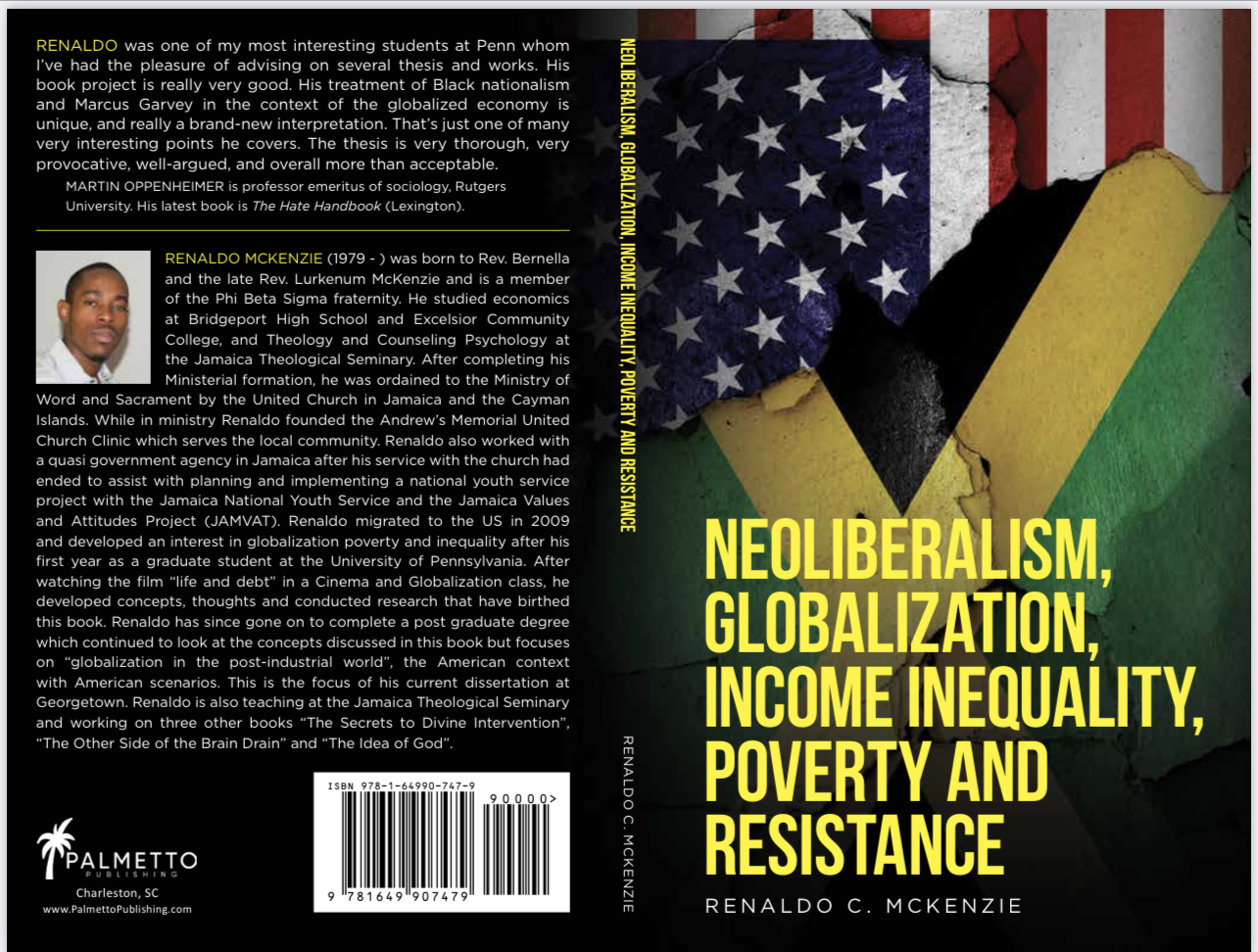
The Book is currently in Print and will be available in paperback first on Amazon, Barnes and Noble and Apple and the neoliberal online store on May 3, 2021. The book can be preordered Online RIGHT NOW CONTACT US or visit our Online Store.

